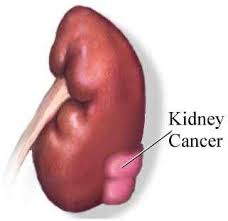Kidney cancer
Kidney cancer, also known as renal cancer, is a type of cancer that starts in the cells in the kidney.
The two most common types of kidney cancer are renal cell carcinoma(RCC) and transtional cell carcinoma(TCC, also known as urothelial cell carcinoma) of the renal pelvis. These names reflect the type of cell from which cancer developed.
The different types of kidney cancer (such as RCC and UCC) develop in different ways, meaning that the diseases have different long-term outcomes, and need to be staged and treated in different ways. RCC is responsible for approximately 80% of primary renal cancers, and UCC accounts the majority of the remainder.
Causes
It’s not clear what causes renal cell carcinoma.
kidney cancer begins when some kidney cells acquire mutations in their DNA. The mutations tell the cells to grow and divide rapidly. The accumulating abnormal cells form a tumor that can extend beyond the kidney. Some cells can break off and spread (metastasize) to distant parts of the body.
Risk factors
Factors that can increase the risk of kidney cancer include:
- Older age. Your risk of kidney cancer increases as you age.
- Smoking. Smokers have a greater risk of kidney cancer than nonsmokers do. The risk decreases after you quit.
- Obesity. People who are obese have a higher risk of kidney cancer than do people who are considered average weight.
- High blood pressure (hypertension). High blood pressure increases your risk of kidney cancer.
- Treatment for kidney failure. People who receive long-term dialysis to treat chronic kidney failure have a greater risk of developing kidney cancer.
- Certain inherited syndromes. People who are born with certain inherited syndromes may have an increased risk of kidney cancer, including those who have von Hippel-Lindau disease, Birt-Hogg-Dube syndrome, tuberous sclerosis and familial papillary renal cell carcinoma.
Symptoms
Kidney cancer rarely causes signs or symptoms in its early stages. In the later stages, kidney cancer signs and symptoms may include:
- Blood in your urine, which may appear pink, red or cola colored
- Back pain just below the ribs that doesn’t go away
- Weight loss
- Fatigue
- Intermittent fever
Homoeopathic Treatment
The scope of Homeopathy for cancer management varies depending on the type of cancer, stage of cancer and the general health of the patient. Following are some of the aspects of Cancer management with Homeopathy:
- One of the most distressing complaints associated with some varieties of Cancer is the agonizing pain. Conventional medicines can provide pain relief but only to a certain extent and these medicines are not without any side effects. Moreover, there is always a restriction to the dosage that can be safely administered to the patient. The advantage of administering Homeopathic medicines in such cases is that there can be effective pain control without inducing any side effects.
- Homeopathy can help in improving the general well-being and vitality of the patient.
- Conventional treatment options for cancer (chemotherapy, radiotherapy, etc) are associated with distressing side effects and homeopathy can play a definitive role to counter these side effects.
- The diagnosis of cancer often leaves the patient with a sense of depression, anxiety, and fear. The treatment may induce additional irritability, impatience and mood fluctuations. Homeopathy can influence the psyche of the patient and help him to deal with these emotions in a better way.
- Homeopathic medicines may also have a role to play in controlling the pace at which the disease increases and spread of the disease to other organs.
Homeopathic medicines can also be administered along with the allopathic medicines.

